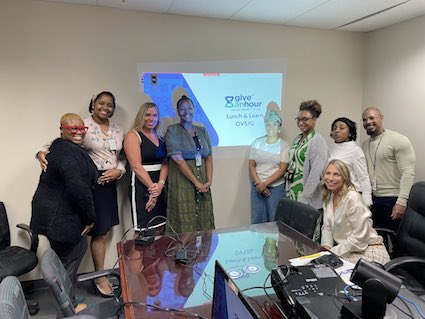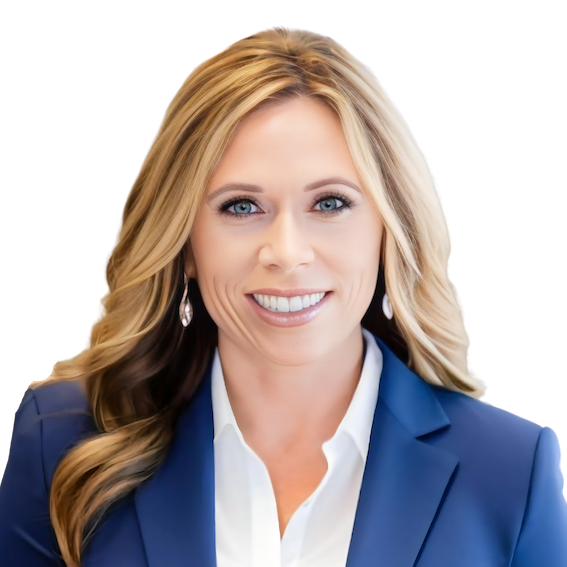Meet Dr. Trina Clayeux, CEO of Give an Hour, which provides innovative multimodal solutions to accessing equitable mental health services and resources for individuals and communities in the USA. She’s been recognized by the National Association of Development Boards for innovation and received the Sailing Award for Leadership Excellence from Spokane Community College and the Nonprofit of the Year award from the Chase Foundation.
“Leadership is an ongoing practice, and it is crucial to anchor yourself on a solid foundation of values and principles because you will be tested a lot”
How Were You as a Kid?
As a child, I was a whirlwind of energy, always moving, never still, either going full speed or completely asleep, a trait that has followed me into adulthood. My mom would often describe me as someone who didn’t watch where I was going. I had a close-knit group of adventurous friends from various backgrounds, and I was always fascinated by life outside the U.S.
Before I could read, an older neighbor would read my favorite books to me. I was so upset that I couldn’t read them myself that I memorized them word for word. This sparked a lifelong passion for reading, something that my mom and I still bond over today. Sports also became a consistent passion in my life, evolving from competitive school sports like softball and volleyball to mountain biking, hiking, and running. I’ve spent two decades participating in races and challenging myself to learn a new sport every year, which led me to triathlons, including a full Ironman and a few halves, before shifting back to volleyball and weightlifting.
Academics came naturally to me, and I was eager to enter the adult world early, though I now wonder what I was thinking. This early drive nurtured a strong work ethic, self-reliance, and a hint of stubbornness—something my husband affectionately refers to as "hard ears" in his Barbadian dialect, meaning I don’t listen easily. This stubbornness served me well as a first-generation college student. I pursued higher education just before turning 20 with little knowledge of how it worked, juggling full-time work, full-time school, friends, and sports while always striving for the next goal.
“At Give an Hour, our innovative approach is individualized, responsive, and informed, placing us at the forefront of customized mental health care”
You earned a doctorate in leadership studies from Gonzaga University, a master’s degree in public administration from Portland State University, and a bachelor’s degree in criminal justice from Boise State University, why did you choose those courses of study?
I had a desire to work in social impact areas. To create meaningful policies and procedures, I knew I needed to understand the impact they would have on people's lives. Public sector work requires leaning into nuance, learning what’s important to the communities you serve, and understanding their goals and dreams.
You can’t write effective policies without understanding the lives they affect. I felt it was necessary to live in both the policy-making and community spaces, to have the legitimacy to work in both areas. My goal was to upend and disrupt policies in a way that would open them up to support the people they are meant to help.
You were chief operations officer for social impact nonprofit organizations addressing educational, socioemotional, and affordable housing disparities across low-wealth communities, you also served as a director and assistant dean for both the K-12 and community college systems, what are the biggest lessons you have learned over these years?
Leadership is an ongoing practice, and it’s crucial to anchor yourself on a solid foundation of values and principles because you will be tested. A lot. The importance of proximity to problems cannot be overstated; if you don’t include those directly affected in shaping solutions, your efforts will be ineffective. Social problems don’t resolve on their own; we must be bold and challenge systems that don’t equally support everyone, just as we would for a friend or family member—it has to feel personal.
You are the CEO of Give an Hour, for people who do not know, tell us about this national organization and why you decided to work in it.
Give an Hour, founded in 2005, is a national organization that was primed for disruptive conversations and unique approaches. It was a unique opportunity to do something different, not replicate existing models, and apply my experience to a national scope. I’m working with the team to build out our model, getting closer to people, being better informed, and delivering better services.
We’re working to change how mental health is thought about and delivered. We aim to work alongside people instead of choosing solutions for them, creating a system of values that is responsive and customized to individual nuance. Our approach allows us to look back at the response and collect data to help inform future initiatives in other communities.
“We can’t move people based on what we decide; we have to listen and see where they want to land based on their wants and needs”
We know other associations in the USA support mental health, what does Give an Hour make unique?
At Give an Hour, our innovative approach is individualized, responsive, and informed, placing us at the forefront of customized mental health care. We listen to what individuals want and need, educate mental health providers to understand the community on a deeper level and customize our services and support system to be responsive to long-term health and wellness.
Our four-step approach includes: listening, leaning in to gather an informed response, continuing to learn and engage, and then helping communities lead with resilience.
What are the things that make you prouder to be part of Give an Hour?
I’m most proud of creating conditions for people to thrive and utilize their unique talents without forcing them into a particular mold. We are in the people business, and it’s essential to connect genuinely with individuals, approaching them with the reverence they deserve and the passion they bring.
I love learning from people and providing a genuine experience rooted in internal strength and human connection from the inside out.
You have been recognized by the National Association of Development Boards for innovation and received the Sailing Award for Leadership Excellence from Spokane Community College and the Nonprofit of the Year award from the Chase Foundation. Additionally, you have presented at conferences related to human-centered design, trauma-informed practices, and a replication model serving vulnerable populations. You are a Board member at Arise Collection and the Leadership Triangle Alumni. You were also awarded a Leadership Triangle Executive 2020 Goodmon Fellow, what´s the recipe for your success?
Humility and a deep appreciation for people are at the core of my success. Making people feel like they belong and can connect is crucial. Trusting people and the journey with them creates excitement and synergy, allowing everyone to show up authentically.
What does a normal workday look like for you?
My day starts early with a workout, followed by driving kids to school. Once home, it’s coffee all morning, followed by back-to-back emails and meetings throughout the day. I try to get outside at midday with a podcast, which often promotes creative problem-solving or a shift in perspective for the remainder of the day.
What do you love most about your job? & what is the most difficult part?
I love the endless possibilities when you bring together the synergy of people and spirits. Seeing the impact when people realize you’ve learned in and learned from them is incredibly rewarding.
The most difficult part right now is breaking through the noise and discourse around mental health, particularly the stigma. Getting people comfortable with uncertainty and the unknown is challenging, and there’s a fear that the momentum could lose steam. It’s crucial to keep people mobilized and focused on the granular aspects of mental health as an ongoing journey, which requires nuance and listening to avoid unconscious judgment.
What is one strategy that has helped you grow in your professional ladder?
Meeting people where they are. Meeting them where they are and finding out where they want to be is crucial. We can’t move people based on what we decide; we have to listen and see where they want to land based on their wants and needs.
Do you have a book, podcast, or talk that’s had a deep impact on your thinking?
Podcasts have been particularly impactful for me, including Re-Thinking, Shoulder to Shoulder, Unique Conversations that are not happening, and Diary of a CEO.
Do You Have a Particular Philosophy Guiding Your Career Decisions?
Listening and learning are my guiding philosophies. They have helped me navigate my career decisions and continue to shape my approach to leadership and growth.
What Do You Like to Do in Your Spare Time?
In my spare time, I enjoy being in nature, engaging in physical activity, reading, listening to podcasts, and exploring the learning process of cooking (though I don’t eat it). I also cherish spending time with an intimate circle of friends.
Many authors say women can and must strive to have everything – a shining career, a blossoming family life, and a perfectly balanced lifestyle all at once, others point out that– then women are placing unrealistic expectations on themselves if they believe they can have it all, you are married and have 2 kids, so according to your experience, what do you think about these statements?
I’m grateful to my mother for not setting those expectations for me. I don’t gauge myself against those markers of success or fulfillment. I prefer to set realistic goals in both my personal and professional life and adjust as needed, rather than fit into expectations that are set up for repeated failures and aren’t adaptable to changing situations. I push back on expectations of how one "should" show up or perform in these roles if it doesn’t align with me or those close to me.
What Are Your Plans for the Future?
I plan to continue iterating and amplifying the voices of those who resonate with Give an Hour’s model of service. I want to continue amplifying our work, listening to nuances, and avoiding the normative approaches that can stifle innovation.
What Are the Myths You Would Like to Dispel About Mental Health?
Three come to mind. First is that people have to hit rock bottom to get better.
This belief discounts preventative care and early intervention. It perpetuates the idea that struggles aren’t valid unless they are at their worst.
Another is that Mental Health is separate from physical, nutritional, and spiritual health. Most of us can agree that this is not logically true, but that’s not how we practice health and wellness in real life. So there’s still a big disconnect that’s being portrayed.
Finally, Peer-to-Peer support isn’t therapeutic. Clinical care and peer support have their unique strengths and can be standalone or integrated as part of a holistic approach. Clinical care can address medical and psychological aspects generally for time-limited durations whereas peer support can offer social and emotional needs for longer periods.
What Tips Can You Give to Young Girls Who Want to Be Like You?
Notice the traits and qualities that you admire in others and try them on. Be dedicated to becoming you by surrounding yourself with a diverse community. Practice the skill of really listening to them, even if you can’t relate, and be curious about their interests, stories, and experiences.
Who Is the Woman You Admire the Most and Why?
My mother. At 86 years old, she is independent, active, feisty, and always open to new adventures. Despite having many reasons not to be, she remains kind, caring, loving, and optimistic.
Name: Dr. Trina Clayeux
Sector: Mental Health / Healthcare
Company: Give an hour
Designation: CEO
Country: USA
Social media:






